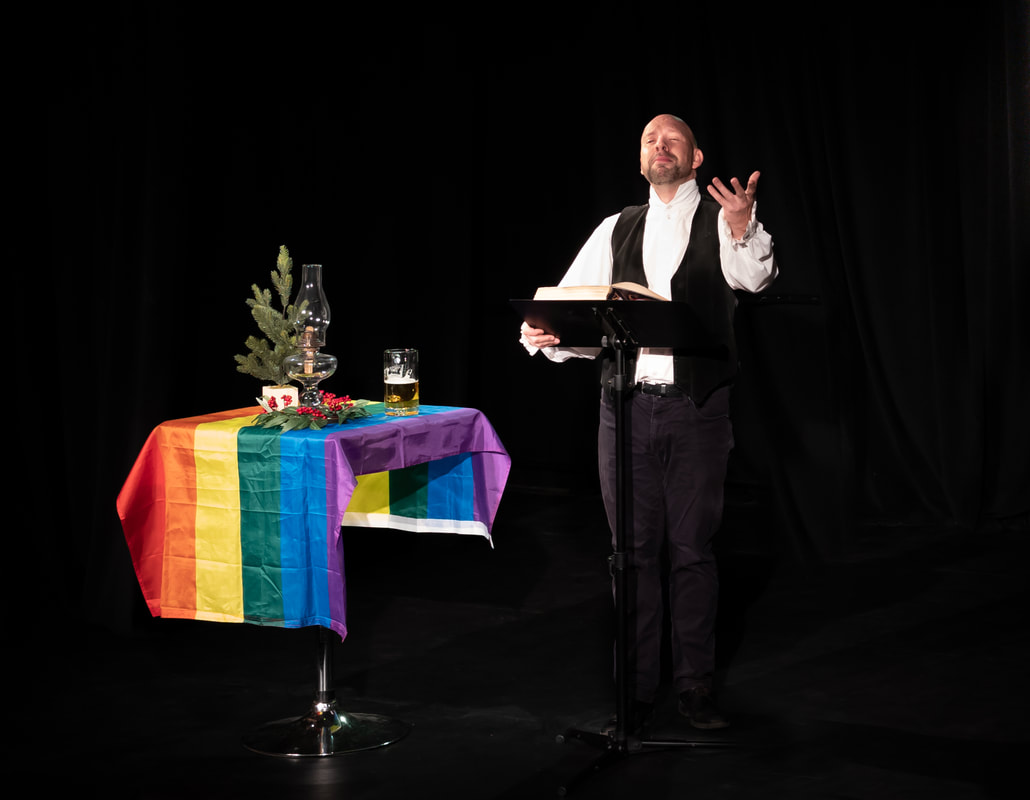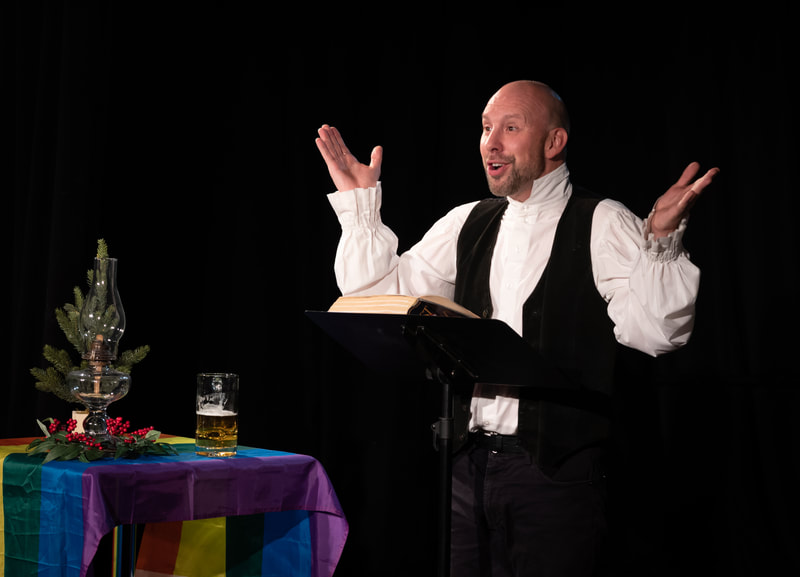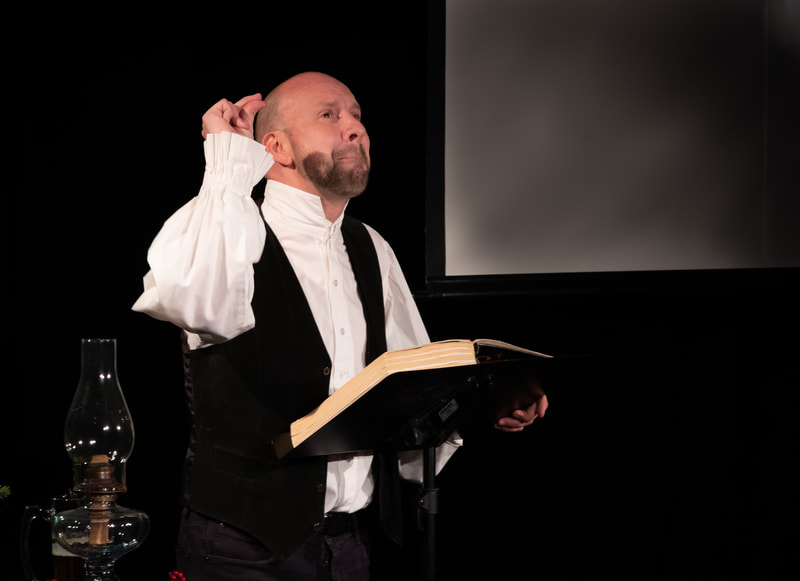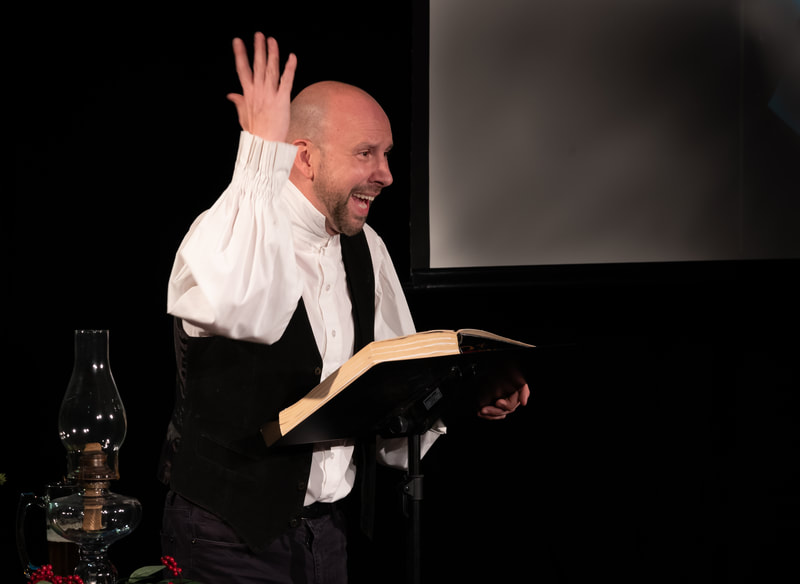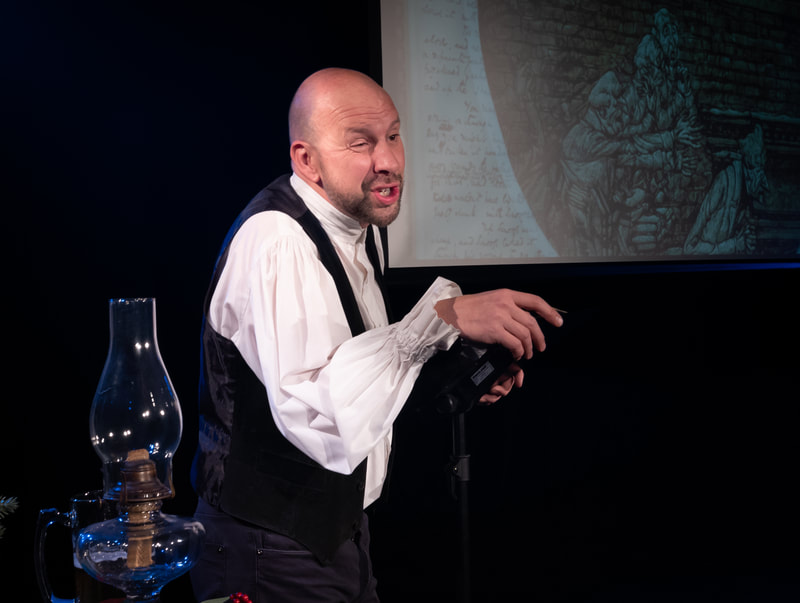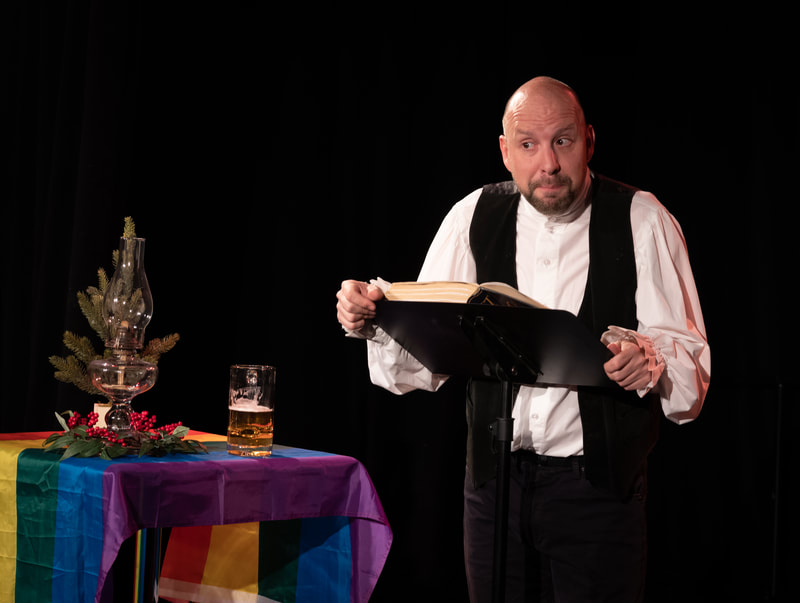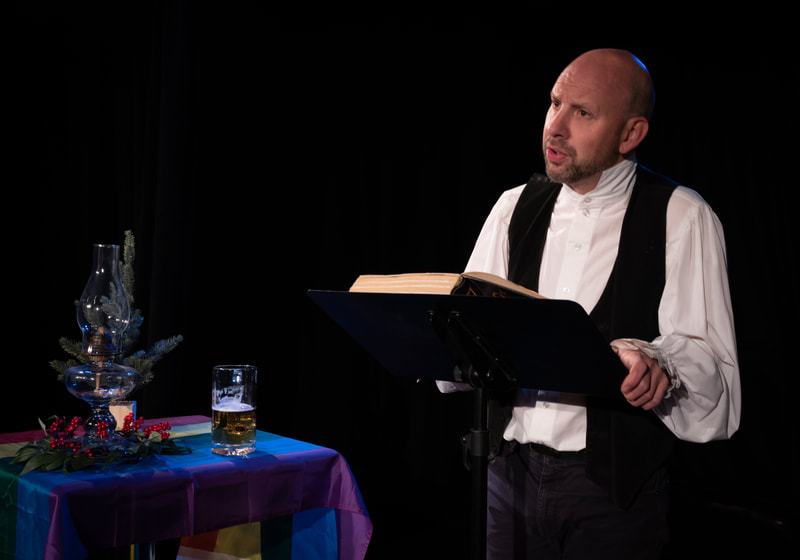The Real Christmas Carol
written by and starring
David Schlosser

This is not designed to be a downbeat review here, but it could seem that way.
Reader Beware: There's REAL happiness here, but it's found in a way that will challenge most people right down to their toes.
One of the paradoxical aspects of literary classics is that they present a person, place, thing, or situation from one particular viewpoint - the author's. In the case of Charles Dickens's A Christmas Carol, the stereotype he created in nearly everyone's mind about the Christmas Season has caused unexpected amounts of pleasure for 176 years. Yet, for some, this play that is a must-see for a lot of people has also produced untold emotional pain for what seems like decades more than that.
There's joy in the stereotyped version of THE big holiday for Americans - we have an image of what it must feel like for a child rushing from a cozy bed to the tree on Christmas morning, to have one's family huddled nearby to light the Menorah at Hanukkah celebrating the victory of an oppressed people over their oppressors, or other family-based rituals of this most spectacular of all Holiday Seasons. Yet, there's also heartache for some when the iconic mental pictures of the Mother of all Holidays don't match one's history and are associated with pain, sadness, or evil.
Artists, like David Schlosser (a local actor, playwright, and producer), roughs up the cliche version of a story about happiness in his A Real Christmas Carol by giving us an other-side-of-happiness rendering.
David wrote and stars in a mischievous theatrical performance that taps directly into both extremes of one of the most stereotypical of all holidays... Christmas. His play is told through a remarkable set of eyes to Dicken's nostalgic Christmas story : Here, one "Ebeneezer James Catawalter Scrooge" gives us his alternative view of what took place in those mystical London holiday twinklings of the eye that Dickens implanted in everyone.
Certainly, presenting "the other side" of the Christmas Classic makes it all sound disturbing, boring, and maybe even ghoulish. After all, we are rooting for Tiny Tim, and the idea that there is another side to this (where we might actually appreciate the nature of Scrooge as he truly is), can be weird and unsettling. But, because of David's talent as an actor, he pulls off a really fascinating view of the Christmas season that is entertaining, funny, wise, and meaningful all in one. Some multimedia slides, a sip or two on a mug of beer, and an damn good London accent help move the narrative along. It is more than interesting because of David's range and ability to make the Cockney-tinged words come alive... it doesn't take long to realize we are ACTUALLY hearing Scrooge recount the facts of the story as he lived them. To Scrooge this is the meat on the bones of the "fake news" Dickens gave us in the "first" version.
Christmas is not a celebration everyone enjoys. This particular Scrooge story proves that. But, The celebration of Christmas can feed the soul in two ways now that you've seen David's play... It can give us a sense of appreciation for our own warm circumstances of a life fulfilled as well as for the circumstances of others with less to remind them of the joy of the Christmas (Amercian?) dream.
Reader Beware: There's REAL happiness here, but it's found in a way that will challenge most people right down to their toes.
One of the paradoxical aspects of literary classics is that they present a person, place, thing, or situation from one particular viewpoint - the author's. In the case of Charles Dickens's A Christmas Carol, the stereotype he created in nearly everyone's mind about the Christmas Season has caused unexpected amounts of pleasure for 176 years. Yet, for some, this play that is a must-see for a lot of people has also produced untold emotional pain for what seems like decades more than that.
There's joy in the stereotyped version of THE big holiday for Americans - we have an image of what it must feel like for a child rushing from a cozy bed to the tree on Christmas morning, to have one's family huddled nearby to light the Menorah at Hanukkah celebrating the victory of an oppressed people over their oppressors, or other family-based rituals of this most spectacular of all Holiday Seasons. Yet, there's also heartache for some when the iconic mental pictures of the Mother of all Holidays don't match one's history and are associated with pain, sadness, or evil.
Artists, like David Schlosser (a local actor, playwright, and producer), roughs up the cliche version of a story about happiness in his A Real Christmas Carol by giving us an other-side-of-happiness rendering.
David wrote and stars in a mischievous theatrical performance that taps directly into both extremes of one of the most stereotypical of all holidays... Christmas. His play is told through a remarkable set of eyes to Dicken's nostalgic Christmas story : Here, one "Ebeneezer James Catawalter Scrooge" gives us his alternative view of what took place in those mystical London holiday twinklings of the eye that Dickens implanted in everyone.
Certainly, presenting "the other side" of the Christmas Classic makes it all sound disturbing, boring, and maybe even ghoulish. After all, we are rooting for Tiny Tim, and the idea that there is another side to this (where we might actually appreciate the nature of Scrooge as he truly is), can be weird and unsettling. But, because of David's talent as an actor, he pulls off a really fascinating view of the Christmas season that is entertaining, funny, wise, and meaningful all in one. Some multimedia slides, a sip or two on a mug of beer, and an damn good London accent help move the narrative along. It is more than interesting because of David's range and ability to make the Cockney-tinged words come alive... it doesn't take long to realize we are ACTUALLY hearing Scrooge recount the facts of the story as he lived them. To Scrooge this is the meat on the bones of the "fake news" Dickens gave us in the "first" version.
Christmas is not a celebration everyone enjoys. This particular Scrooge story proves that. But, The celebration of Christmas can feed the soul in two ways now that you've seen David's play... It can give us a sense of appreciation for our own warm circumstances of a life fulfilled as well as for the circumstances of others with less to remind them of the joy of the Christmas (Amercian?) dream.
